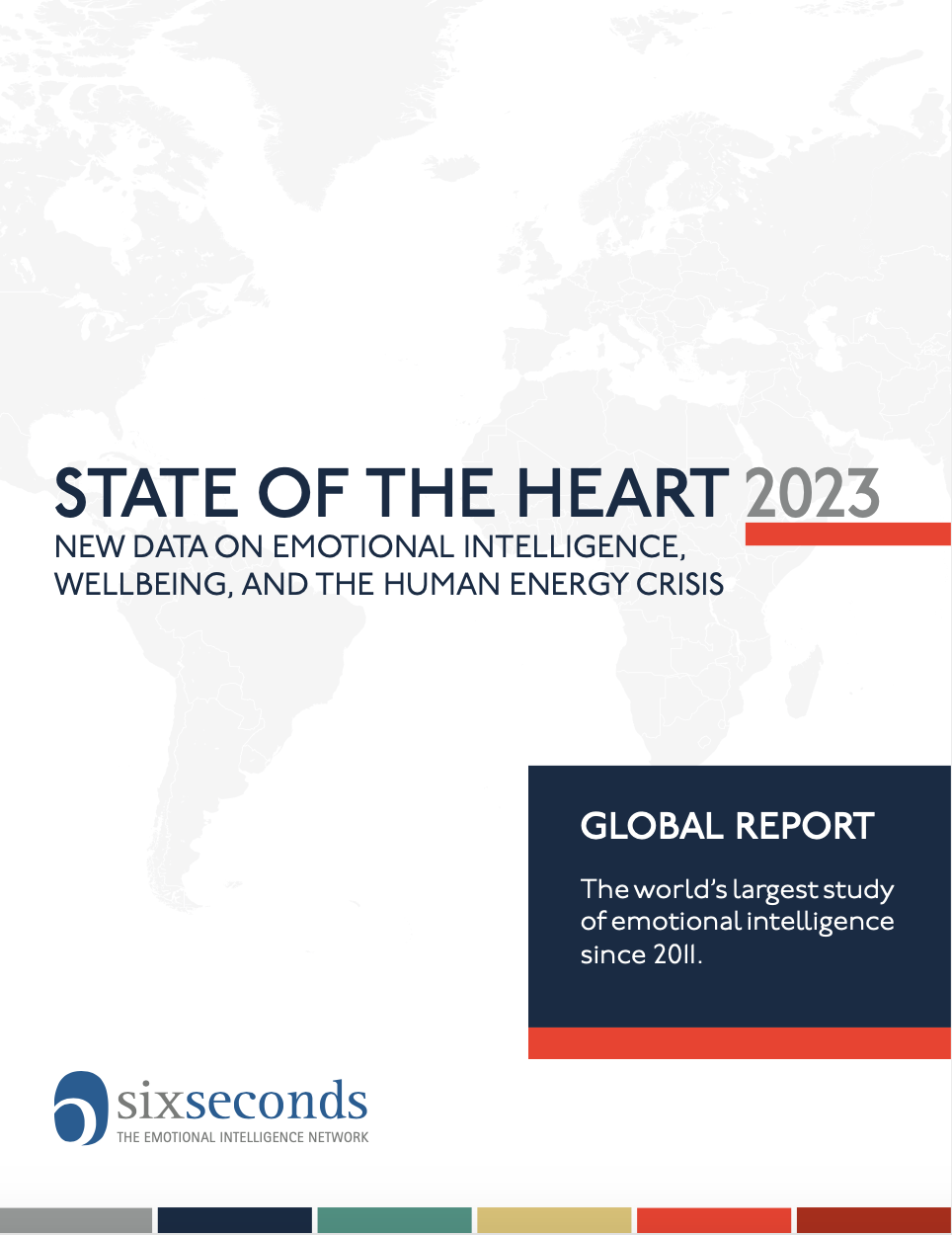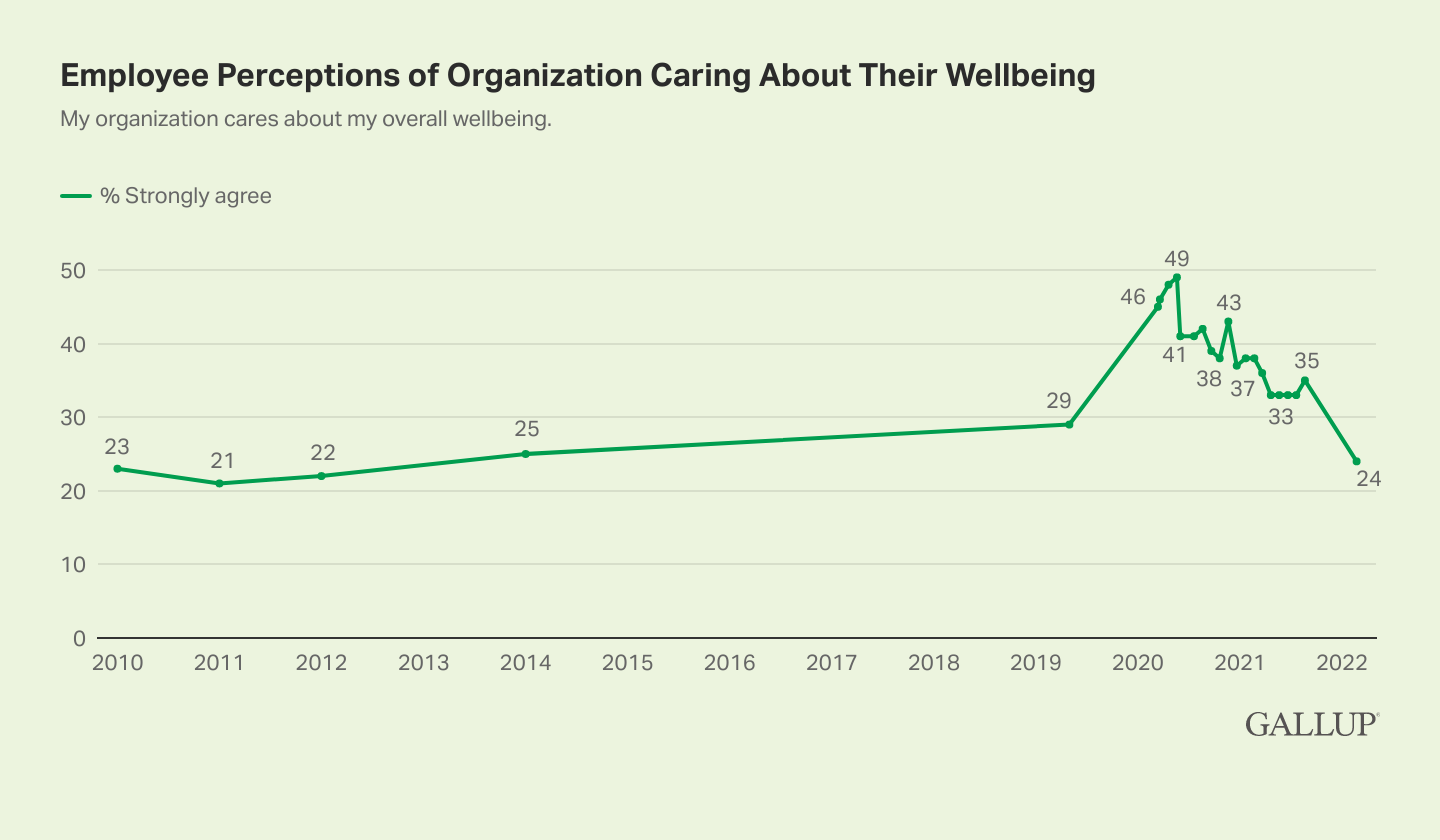New Research: The Emotional Pandemic Is Still Raging
Recently published data from the world’s largest study of emotional intelligence reveals a widespread human energy crisis, fueled by years of stress and uncertainty. The lesson? It’s time to reinvest in mental and emotional health.
Want the full State of the Heart report? Download your free copy here.
By Michael Miller

In the heart of the pandemic, in March 2021, World Health Organization Director General Tedros Adhanom Ghebreyesus issued a warning about the long-term mental health toll of the pandemic.
“When there is mass trauma,” Ghebreyesus said, “it affects communities for many years to come.”
Recently published data from the world’s largest study of emotional intelligence provides some of the strongest evidence yet that communities all over the world are still struggling, as Ghebreyesus predicted, with the emotional aftershocks of the pandemic.
Burnout is high, especially for men and younger generations. Wellbeing is falling. Many people feel socially isolated and disconnected. Emotional intelligence – the skills people need to thrive and connect in complex and uncertain times – has declined for 3 consecutive years – and most of the last decade. That includes critical skills like empathy, optimism and a sense of purpose, among others.
“On average, people are more volatile and less likely to be able to navigate emotions,” says Six Seconds CEO Joshua Freedman, one of the coauthors of the study. “They’re less likely to feel connected to empathy, to others, or to a bigger sense of purpose. They’re less likely to be able to accurately understand and label the feelings they’re experiencing – and that’s a crucial foundation for mental and emotional health.”
Are workplaces prioritizing wellbeing? Just a pandemic bubble
The pandemic shifted people’s perspectives on the relationship between work and wellbeing. Microsoft’s Work Trends report, for example, found that over half of employees (53%) say they are more likely to prioritize health and wellbeing over work than before the pandemic. For a time, it seemed like organizations felt the same way – and the pandemic would mark a real turning point in employee wellbeing: A remarkable 49% of respondents strongly agreed that their organization cared about their wellbeing in 2020, during the darkest days of the pandemic – a 20-point increase from 2019 and the highest number on record. Since then, that number has plummeted – even erasing the pre-pandemic gains of the 2010s:
The result? An emotional mess, and a key driver of the human energy crisis we’re facing.
- Only 23% of employees around the world are engaged, and 60% describe themselves as emotionally detached.
- Over half of managers are burnt out, and they are often the ones tasked with providing emotional support for employees.
- The emotional intelligence skills that counter burnout reached an all-time low (State of the Heart 2023)
“A healthy workforce is the foundation for thriving organizations and healthier communities,” says US Surgeon General Dr. Vivek Murthy. The 2023 State of the Heart report adds to the growing body of evidence that most organizations are falling short.
Some organizations, of course, go above and beyond to prioritize worker wellbeing – and they reap the benefits of greater loyalty, engagement and ultimately, profits. And there are important differences by sector as well. The tech industry has a major worker wellbeing problem, for instance, and scored the lowest on average emotional intelligence and highest for burnout of any sector in the State of the Heart study.
But across sectors, the data is clear: Companies are not meeting employee demands for employee wellbeing – and people are suffering as a result.
A path forward: Finding our way through complexity
The good news is that emotional skills are learnable – and hopefully, the worst of the chaos is behind us. The State of the Heart reveals encouraging data for specific demographics, especially women, who are leading the post-COVID comeback. That shows us a path forward.
“Emotional intelligence is key for dealing with the complexities of today’s world,” says Sarah Canna, Team Lead for Career Management and Development at the World Health Organization. “It’s very important as emotional intelligence practitioners to reinvest in networking, collaborating and exchanging ideas. This is something we’re concentrating on in the World Health Organization.” (from State of the Heart: A Global Perspective on Emotional Intelligence)
The State of the Heart report should serve as a wakeup call for business leaders, parents, educators and more:
It’s time to invest in mental and emotional health. It’s time to equip people with the emotional skills they need to thrive – at home and at work.
4 Steps to Get Started Today
If you want to take steps today to help combat the human energy crisis and grow your emotional intelligence and wellbeing, here are some resources to get started:
1 Emotional intelligence skills are one key resource to support wellbeing mental health. Download our free 12 Days of Wellbeing eBook or our Mental Health Kit for Children, Teens & Adults.
2 Join us for POPUP Festival this year! In partnership with UNICEF World Children’s Day, POP-UP Festival consists of free, playful, meaningful activities to help kids grow their emotional intelligence and take action on the Sustainable Development Goals (SDGs).
3 Support your managers to support employees – and themselves – more effectively. Based on the US Surgeon General’s Framework for Workplace Mental Health & Wellbeing, our Managing Wellbeing eLearning course for managers is a quick, cost effective way to implement emotional intelligence in your organization’s identity.
4 Invest in your own emotional intelligence! Save your spot today for Unlocking EQ, or take the Six Seconds Emotional Intelligence assessment for yourself and get a 1:1 debrief with an emotional intelligence coach.
About the study
State of the Heart is the world’s largest study of emotional intelligence. Based on the Six Seconds Emotional Intelligence assessment and drawing on a global dataset from over 129 countries, State of the Heart uses a randomized sample balanced by geography, gender, and age.
About Six Seconds
Our mission is growing the world’s emotional intelligence. Through assessments, certification training and coaching, we equip people with the skills they need to thrive in every aspect of their lives.
Want to learn more? Contact us →
The State of the Heart: 2023
What are the key takeaways from this year’s State of the Heart report?
 Global emotional intelligence scores declined sharply during the pandemic and in the aftermath. From 2018 to 2022, global scores declined on every emotional intelligence competency.
Global emotional intelligence scores declined sharply during the pandemic and in the aftermath. From 2018 to 2022, global scores declined on every emotional intelligence competency.
 The world is facing a human energy crisis – at home and at work. Wellbeing scores continue to decline, while rates of burnout, social isolation and emotional detachment are at all-time highs. These issues are especially concerning for younger generations – Millennials and Gen Z.
The world is facing a human energy crisis – at home and at work. Wellbeing scores continue to decline, while rates of burnout, social isolation and emotional detachment are at all-time highs. These issues are especially concerning for younger generations – Millennials and Gen Z.
 Women are leading the post-COVID comeback. Starting in 2021, most of women’s emotional intelligence and life success factor scores rebounded in a significant way, even as men’s continued years-long declines.
Women are leading the post-COVID comeback. Starting in 2021, most of women’s emotional intelligence and life success factor scores rebounded in a significant way, even as men’s continued years-long declines.
 Emotional intelligence scores are not evenly distributed throughout the world. Africa has the highest average emotional intelligence, and Asia the lowest. All seven global regions have unique strengths and opportunities.
Emotional intelligence scores are not evenly distributed throughout the world. Africa has the highest average emotional intelligence, and Asia the lowest. All seven global regions have unique strengths and opportunities.
 Burnout is not evenly distributed among sectors and industries. While some have become market leaders in the post-pandemic recovery – like Marketing & PR and Hospitality & Travel – others – like Tech and the Pharmaceutical industry – have seen sustained drops.
Burnout is not evenly distributed among sectors and industries. While some have become market leaders in the post-pandemic recovery – like Marketing & PR and Hospitality & Travel – others – like Tech and the Pharmaceutical industry – have seen sustained drops.
Media inquiries? Please contact us here.

- Emotional Intelligence at Work:In the Era of AI, What Happens to Human Skills? - November 19, 2024
- Fortifying the Mental Health of the Entire School Community with Emotional Intelligence - October 30, 2024
- Emotional Intelligence at Work: Exploring the Principles of Exceptional Leaders - October 15, 2024

